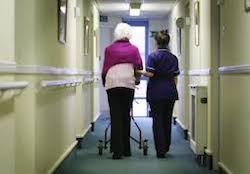The Tory government’s response to Covid-19 has been arrogant, incompetent and irresponsible, according to global health expert SOPHIE HARMAN. In the first of a two-part interview with the ILP’s WILL BROWN, she says it is time for Labour to step up.
Will Brown: How well or badly has the government performed in responding to the pandemic?
 Sophie Harman (pictured): It’s an open secret the UK’s response has been a catastrophic failure. The only thing it’s done well is the furlough scheme – how quickly it was mobilised. Given it’s such a massive government scheme, it seems to be working. The rest has been a series of missteps and mistakes.
Sophie Harman (pictured): It’s an open secret the UK’s response has been a catastrophic failure. The only thing it’s done well is the furlough scheme – how quickly it was mobilised. Given it’s such a massive government scheme, it seems to be working. The rest has been a series of missteps and mistakes.
At the start of the outbreak I was prepared to give the government some benefit of the doubt. We didn’t know the nature of the outbreak or where it was going to hit, and everyone was learning on the job.
But what has been so catastrophic is the way they’ve ignored the real basics of any public health emergency – that you protect your care workers and your healthcare workers at all costs – to me, that has been really inexcusable. The delays in delivering PPE (personal protective equipment), or providing PPE that was deficient, is a real scandal.
Everything else is an addition – lockdowns, quarantine, all that is secondary. Test and trace, protect your healthcare and care workers, identify who else is vulnerable and how best to protect them. And then get to the wider secondary issues: who else to protect, how you protect the economy, how you protect other vulnerable people, such as vulnerable children.
Also, there was no wider understanding of the secondary impacts on healthcare – that people don’t go to hospital or their GP, for example – nor of the secondary social, political and economic impacts, which can be anything from domestic abuse to who is going to do the care work at home if you close schools. So there’s a whole host of things that went wrong.
WB: The government’s defence is that the pandemic was totally unprecedented and unpredictable. You’ve argued elsewhere that we could and did see it coming, that the choice not to prepare was a political one. Could you explain?
SH: You can’t predict the exact type of global pandemic or its scale, and you don’t necessarily know the impact. But there are ways of watching for outbreaks, rapidly assessing their risk, and tried and tested measures that can mitigate the impact to prevent it reaching the scale of Covid-19.
 People who work in global health security have been waiting for ‘the big one’ for a long time, thinking that it is going to happen. That is why we have frameworks for pandemic preparedness in the World Health Organisation (WHO) predicated on ‘when’, not ‘if’. If you’d talked to any global health expert, they couldn’t have told you when but they could have told you this was coming. That’s why you invest in global health security measures.
People who work in global health security have been waiting for ‘the big one’ for a long time, thinking that it is going to happen. That is why we have frameworks for pandemic preparedness in the World Health Organisation (WHO) predicated on ‘when’, not ‘if’. If you’d talked to any global health expert, they couldn’t have told you when but they could have told you this was coming. That’s why you invest in global health security measures.
There have also been growing numbers of pandemics over the past 10 years – SARS, swine flu, avian flu, MERS, Ebola. The UK sends experts to the WHO, and to these health emergencies around the world, so we could have seen it coming.
I think there was a bit of arrogance here – the belief that if it happened we would deal with it better than other countries – and, in the public’s imagination, that health emergencies don’t happen here, they happen in low- or middle-income countries, in Asia, in Africa. And secondly, people thought if it does happen here, we have the knowledge and skills to deal with it.
The government can say, ‘It’s a one-off.’ But it’s not a one-off, this will happen again. Our response dictates the impact it has. There are measures they could have taken to stop it having a catastrophic impact, and to stop it having a long-term impact on future generations.
WB: Have countries that experienced similar crises before been more successful in allocating resources for pandemics – South Korea, for example?
SH: Countries that have been more susceptible to pandemics are more prepared. They understand the stakes and that it’s better to invest a lot up-front than to risk the long-term costs. There’s also an impact on public perception and understanding – there are lessons learned and there’s a fear of it, people don’t want to go back to that experience.
But that doesn’t explain Australia and New Zealand – they are taking a different approach and they haven’t had that experience before.
WB: You’ve spoken before about the importance of community-level action. What role can it play that central governments can’t?
SH: It has multiple roles. The first is mapping how the epidemic is spreading within a particular country. People on the ground have a better awareness of that. It’s interesting how involved communities were with testing and tracing in previous outbreaks, particularly Ebola when community volunteers were trained to do test and trace. They were more effective than an app!
In the UK, communities wanted to do something; everyone felt a bit hopeless staying at home and they wanted to be engaged. The important thing with getting the community on board is government messaging. If you don’t trust your government, then you’re going to ignore government messages.
With Ebola, in Sierra Leone, once they got the paramount chiefs involved there was a real uptake in people saying, ‘We don’t trust the central government, we certainly don’t trust the international community, but we do trust our local leaders.’ It wasn’t just the paramount chiefs – many women don’t trust them – there were roles for other leaders too.
Community-level action also helps to normalise certain behaviours – the two-metre rule, wearing face coverings – that can’t just come from government, especially one people don’t trust. And finally, the community has a role in provision – providing food, assistance, stepping into the breech when the government fails to provide.
WB: Has the government’s approach been too centralised?
SH: The burden has fallen on local authorities but strategy and decision making has been very centralised. And there isn’t much transparency around it. The Leicester case is a huge example – there was no consultation, the council was not engaged, it was told things after the event, and told to implement policies. The communication has been dreadful.
At the start, the government said to local authorities, ‘Do what you need to, spend your contingency resources, and we’ll give you the money back.’ But they haven’t and now 80 per cent of local authorities think they will go bust. It’s a huge dereliction of responsibility from the government.
WB: How has the pandemic exacerbated existing inequalities?
SH: Epidemics and health emergencies exacerbate existing inequalities and they reproduce them, especially gender inequalities. Women are hard hit by a whole multitude of risks – domestic abuse, for example, over-representation in care work and frontline health care around the world, the increased burden of domestic labour, threats to their own jobs and careers.
With Ebola, for example, similar numbers of women in Sierra Leone died of pregnancy-related issues as Ebola. Other epidemics, such as HIV and AIDS, were also heavily gendered but no-one paid attention to these issues until it started affecting rich women in the global north.
 The concern here is how inequalities are reproduced when we start reviving the economy. Boris Johnson is talking about infrastructure, building, not about building the care economy, providing jobs for those who have been caring at home. He shows no regard for how this could exacerbate those inequalities.
The concern here is how inequalities are reproduced when we start reviving the economy. Boris Johnson is talking about infrastructure, building, not about building the care economy, providing jobs for those who have been caring at home. He shows no regard for how this could exacerbate those inequalities.
It has also exacerbated race inequalities. People who work in global health know the shocking statistic that black women in the UK are five times more likely to die from pregnancy-related complications than white women. No-one was paying attention to this.
When Kayla Williams died of suspected Covid-19 in March, after calling an ambulance and being told by paramedics she was not a priority, I remember thinking her tragic death may be a canary as to the treatment of black women in the crisis, a worrying sign of how wider inequalities would affect the pandemic’s impact – as we’ve seen.
Fortunately, the greater impact on black people is being blamed not just on racialised stereotypes, race science and biology – although there has been a bit of that – but on comorbidities [multiple conditions in a single patient] driven by inequality and structural racism.
WB: How well do you think Labour has performed as an opposition?
SH: [At first] Labour was quite absent from the debate around Covid-19. Obviously, they had the leadership contest. But then they took the position to be a kind of wartime government of national unity – to work with the government. I think that was an effective strategy as the British public had no appetite for more political point scoring. That would have backfired.
But as soon as the government was making all these missteps Labour could have been much more aggressive in highlighting the failures and the catastrophic consequences. They could have allied with epistemic communities [networks of experts] around health, very vocal people like Richard Horton, editor of The Lancet. That’s where the criticism was coming from – this community of health experts challenging the scientists on SAGE, challenging the chief medical officer.
The Labour Party seemed out of its depth, or didn’t have advisors, or wasn’t reaching out to advisors, or didn’t realise how big this would be – which is fundamentally a problem. Labour is the party of the workers and the NHS, but they weren’t defending workers and weren’t defending the NHS as publicly and aggressively as they could have.
What is Labour’s critique of the government over what it did and what it could do next? What is Labour offering for a post-Covid recovery? What would it do differently? There’s a new leadership now with its agenda, but it has to put this forward quickly or the government will start implementing its projects and programmes without critical scrutiny or an alternative.
It’s fundamental that Labour develops a position on how we can recover from Covid-19 in a way that is inclusive, that addresses the inequalities, and really puts the care economy at the heart of rebuilding.
—-
Sophie Harman is Professor of International Politics at Queen Mary University London.
She is an expert in global health governance specialising in African politics and gender and was nominated for a BAFTA in 2019 for her work on the film Pili.
Professor Harman has commented extensively on the COVID-19 pandemic, including in the New Statesman and through a series of videos for the Mile End Institute.


